The AnandTech Coffee Lake Review: Initial Numbers on the Core i7-8700K and Core i5-8400
by Ian Cutress on October 5, 2017 9:00 AM EST- Posted in
- CPUs
- Intel
- Core i5
- Core i7
- Core i3
- 14nm
- Coffee Lake
- 14++
- Hex-Core
- Hyperthreading
Benchmarking Performance: CPU Encoding Tests
One of the interesting elements on modern processors is encoding performance. This includes encryption/decryption, as well as video transcoding from one video format to another. In the encrypt/decrypt scenario, this remains pertinent to on-the-fly encryption of sensitive data - a process by which more modern devices are leaning to for software security. Video transcoding as a tool to adjust the quality, file size and resolution of a video file has boomed in recent years, such as providing the optimum video for devices before consumption, or for game streamers who are wanting to upload the output from their video camera in real-time. As we move into live 3D video, this task will only get more strenuous, and it turns out that the performance of certain algorithms is a function of the input/output of the content.
All of our benchmark results can also be found in our benchmark engine, Bench.
7-Zip 9.2: link
One of the freeware compression tools that offers good scaling performance between processors is 7-Zip. It runs under an open-source licence, is fast, and easy to use tool for power users. We run the benchmark mode via the command line for four loops and take the output score.
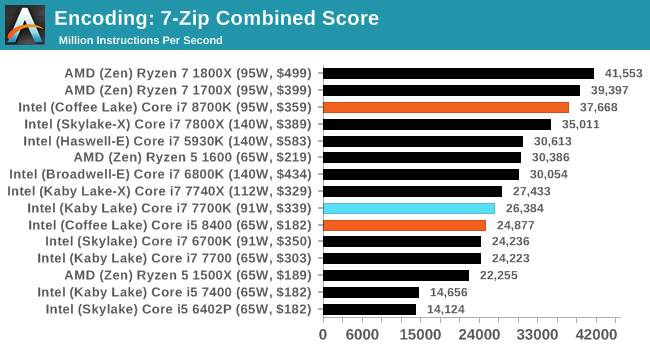
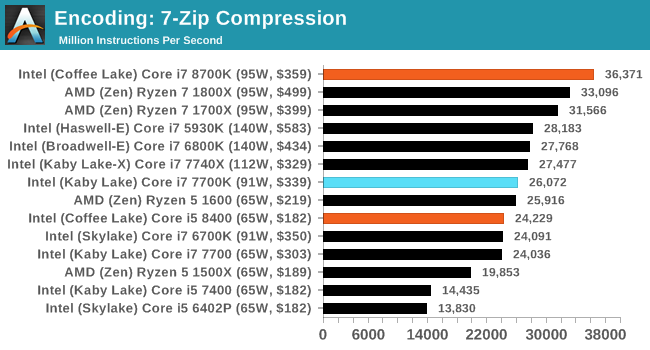
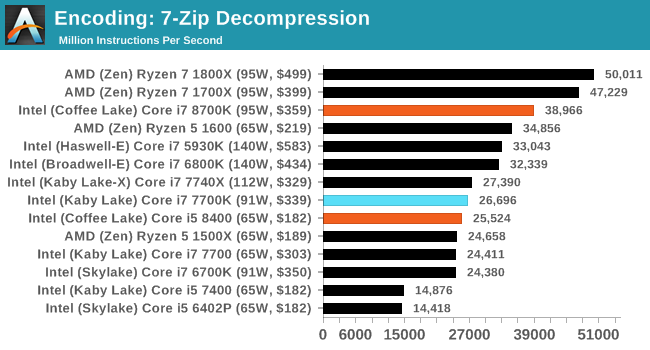
WinRAR 5.40: link
For the 2017 test suite, we move to the latest version of WinRAR in our compression test. WinRAR in some quarters is more user friendly that 7-Zip, hence its inclusion. Rather than use a benchmark mode as we did with 7-Zip, here we take a set of files representative of a generic stack (33 video files in 1.37 GB, 2834 smaller website files in 370 folders in 150 MB) of compressible and incompressible formats. The results shown are the time taken to encode the file. Due to DRAM caching, we run the test 10 times and take the average of the last five runs when the benchmark is in a steady state.
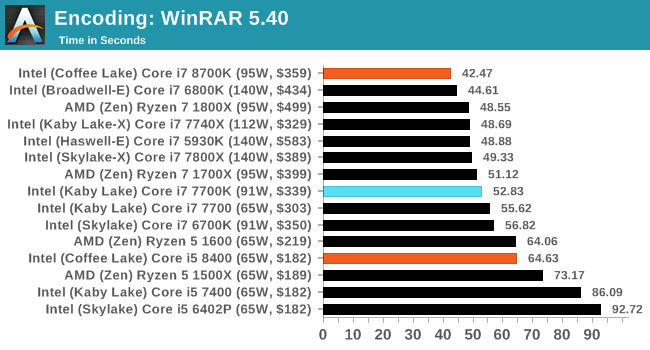
AES Encoding
Algorithms using AES coding have spread far and wide as a ubiquitous tool for encryption. Again, this is another CPU limited test, and modern CPUs have special AES pathways to accelerate their performance. We often see scaling in both frequency and cores with this benchmark. We use the latest version of TrueCrypt and run its benchmark mode over 1GB of in-DRAM data. Results shown are the GB/s average of encryption and decryption.
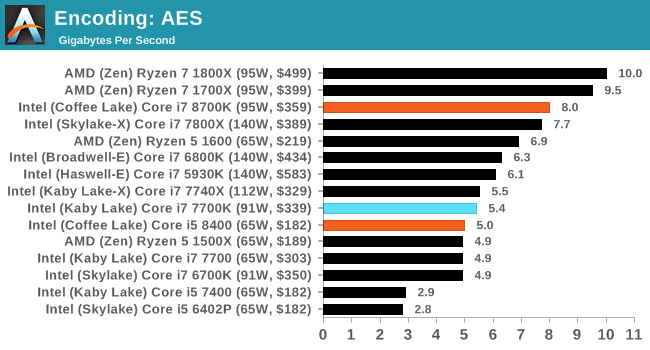
HandBrake v1.0.2 H264 and HEVC: link
As mentioned above, video transcoding (both encode and decode) is a hot topic in performance metrics as more and more content is being created. First consideration is the standard in which the video is encoded, which can be lossless or lossy, trade performance for file-size, trade quality for file-size, or all of the above can increase encoding rates to help accelerate decoding rates. Alongside Google's favorite codec, VP9, there are two others that are taking hold: H264, the older codec, is practically everywhere and is designed to be optimized for 1080p video, and HEVC (or H265) that is aimed to provide the same quality as H264 but at a lower file-size (or better quality for the same size). HEVC is important as 4K is streamed over the air, meaning less bits need to be transferred for the same quality content.
Handbrake is a favored tool for transcoding, and so our test regime takes care of three areas.
Low Quality/Resolution H264: Here we transcode a 640x266 H264 rip of a 2 hour film, and change the encoding from Main profile to High profile, using the very-fast preset.
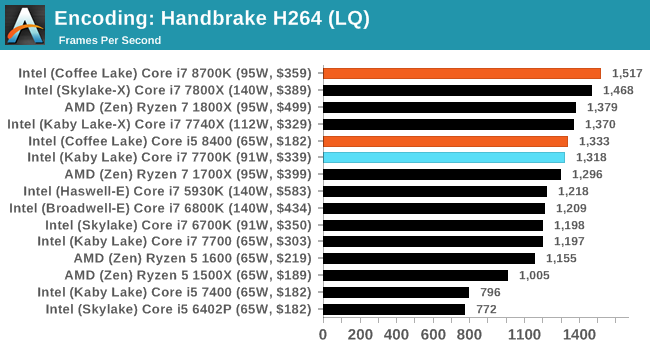
High Quality/Resolution H264: A similar test, but this time we take a ten-minute double 4K (3840x4320) file running at 60 Hz and transcode from Main to High, using the very-fast preset.
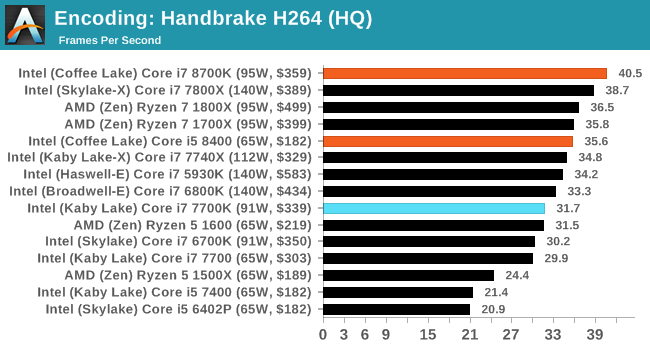
HEVC Test: Using the same video in HQ, we change the resolution and codec of the original video from 4K60 in H264 into 4K60 HEVC.
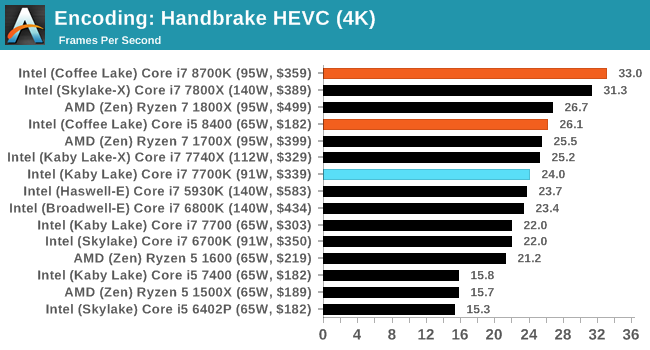










222 Comments
View All Comments
FireSnake - Thursday, October 5, 2017 - link
Awesome revies! Let's read...prisonerX - Thursday, October 5, 2017 - link
No need, here is a quick summary: "Intel blind panic."StevoLincolnite - Thursday, October 5, 2017 - link
At-least they have finally soundly beat my 3930K in the mainstream after 6 years.Still. No point me upgrading just yet.
mapesdhs - Friday, October 6, 2017 - link
Even then there's an interesting option if you want threaded performance; I just upgraded to a XEON E5-2680 v2 (IB-EP) for 165 UKP. Lower 1T speed for sure, but MT should be the same or better as a 3930K @ 4.8. No oc means more stable, less heat/noise/power, and being IB-based means it ups the slots to PCIe 3.0. Not a relevant choice for gaming, but a possibility for those doing VMs, rendering, etc., and just want to get by for a little while longer.Breit - Friday, October 6, 2017 - link
OR search for an XEON E5-1680v2... :)It's an Ivy Bridge-E 8c/16t chip that will fit in Sandy Bridge-E mainboards (x79) and has an unlocked multiplier opposed to this E5-2680v2. So with this you won't lose your overclocking ability.
But in the end, I guess that the greatly reduced power draw and the more "modern" platform from an i7-8700K system compared to the x79 platform will give it the edge here.
mapesdhs - Monday, October 9, 2017 - link
Very interesting that the 1680 v2 is unlocked, I didn't know that.Alas though, availability of the 1680 v2 is basically zero, whereas the 2680 v2 is very easy to find, and the cost of 1680 v2s which are available (outside the UK) is extremely high (typical BIN of 600 UKP, normal auction start price of 350 UKP, completed listings only shown for BIN items which were purchased for between 500 and 600 UKP). By contrast, I bought several 2680 v2s for 165 UKP each. Testing on a P9X79 WS (all-core turbo of 3.1) gives a very impressive 15.44 for CB 11.5, and 1381 for CB R15 which is faster than a stock 8700K (for reference, the 1680 v2 scores 1230 for CB R15). Note the following page on AT has a very handy summary of all the turbo bin levels:
https://www.anandtech.com/show/7852/intel-xeon-e52...
So, I'm very pleased with the 2680 v2 purchase, it's faster than my 3930K @ 4.8, runs with very low temps, much lower power draw, hence less heat, less fan noise and since it's not oc'd it'll be solidly reliable (this particular test system will eventually be in an office in India, so power/heat/reliability is critical). For the target systems in question, it's a great solution. Only thing I noticed so far is it didn't like me trying to set a 2133 RAM speed, but it worked ok at 1866; I can probably tighten the timings instead, currently just at 9/11/10/28/2T (GSkill 32GB kit, 8x4GB).
The 4930K I have though will go into my gaming system (R4E), since I don't mind the oc'ing fun, higher noise, etc., but it's not a system I'll use for converting video, for that I have a 6850K.
Ian.
MrSpadge - Friday, October 6, 2017 - link
Full throttle: yes. Panic: no. Blind: no.Zingam - Saturday, October 7, 2017 - link
Can you buy it? No? Paper launch of Unobtanium 8000? -> panic, PR propaganda bullshit and dirty Intel marketing tactics as usual targeted at lamer fanboys.This comment is written by an Intel user! ;)
prisonerX - Saturday, October 7, 2017 - link
We've got enough dumb Intel apologists here already, thanks.coolhardware - Sunday, October 8, 2017 - link
The i7-8700 is *finally* going to replace my trusty i5-2500K.Ordered my 8700 on Amazon http://amzn.to/2y9IamG ($319) and looking forward to a nice upgrade :-) That is a lot of CPU for the money IMHO.
Kudos to AMD for bringing competition back to the CPU market!